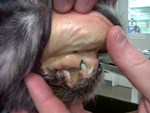Search - Research
491 - 500 of 615 results
-
Evaluation of Biomarkers for assessing response to treatment and outcome in dogs with immune-mediated haemolytic anaemia
Dr Barbara Glanemann and Dr James Swann have been awarded a Kennel Trust Charitable Trust grant for Evaluation of Biomarkers for assessing response to treatment and outcome in dogs with immune-mediated haemolytic anaemia. Immune-mediated haemolytic …Dr Barbara Glanemann and Dr James Swann have been awarded a Kennel Trust Charitable Trust grant for …
-
VetCompass rocks the joint in dogs
Osteoarthritis is the most common joint disease diagnosed in dogs and poses considerable welfare challenges. The condition is progressive and leads to impaired joint function and pain. The VetCompass™ Programme at the RVC collates de-identified EPR …Osteoarthritis is the most common joint disease diagnosed in dogs and poses considerable welfare …
-
VetCompass™ rocks the joint in dogs
Latest VetCompass™ study investigates osteoarthritis in dogs. A new VetCompass™ study is the largest study of osteoarthritis in dogs under veterinary care ever conducted and covered 455,557 dogs. Osteoarthritis is the most common joint disease … -
VetCompass rocks the joint in dogs
A new VetCompass™ study is the largest study of osteoarthritis in dogs under veterinary care ever conducted and covered 455,557 dogs. Osteoarthritis is the most common joint disease diagnosed in dogs and poses considerable welfare challenges.A new VetCompass™ study is the largest study of osteoarthritis in dogs under veterinary care ever …
-
Understanding the socioeconomic impact of Foot and Mouth Disease control in Kenya: an RVC collaboration with The Pirbright Institute and the University of Nairobi
Foot and mouth disease (FMD) is a viral disease of cloven-hooved animals that causes lesions in the mouth and on the feet, alongside generalised illness. It affects cows, sheep, goats and pigs, and although they recover after a couple of weeks, it …Foot and mouth disease (FMD) is a viral disease of cloven-hooved animals that causes lesions in the …
-
New Pet Plan Charitable Trust award
Dr Rebecca Geddes has been awarded a Pet Plan Charitable Trust Pump Priming Grant to research “Is upper urinary tract stone formation in cats caused by disrupted calcium-phosphate metabolism?” Kidney stones are a common problem in many species, …Dr Rebecca Geddes has been awarded a Pet Plan Charitable Trust Pump Priming Grant to research “Is …
-
Angela Holder (early career researcher) awarded a grant to host a LIDO REP summer student
Dr Angela Holder was awarded a grant to host a LIDO REP summer student over summer 2019. This was for an 8 week placement that was aimed at undergraduate students from universities where the numbers of students that go on to do PhDs is low. The …Dr Angela Holder was awarded a grant to host a LIDO REP summer student over summer 2019. This was …
-
VetCompass study identifies the side effects to systemic glucocorticoids in dogs in the UK
Glucocorticoids are commonly used in companion animal veterinary practice. However, glucocorticoids have been associated with various side effects. This new VetCompass study used data from primary-care clinics in the UK. Review of the records of 3,00 … -
Preliminary study to investigate the prevalence and risk factors for the development of chronic kidney disease post acute kidney injury
Dr Laura Cole, Staff Clinician in Emergency and Critical care at the Queen Mother Hospital for Animals, has been awarded a grant by Petplan Charitable Trust, to investigate the prevalence and risk factors for the development of chronic kidney …Dr Laura Cole, Staff Clinician in Emergency and Critical care at the Queen Mother Hospital for …
-
RVC researchers reveal the molecular mechanisms that underlie a common genetic form of ‘tying up’ in horses.
In 2008, researchers at the University of Minnesota revealed the genetic cause of type 1 Polysaccharide Storage Myopathy (PSSM1), a common disorder associated with exertional rhabdomyolysis in horses. Affected animals have a mutation in a key …In 2008, researchers at the University of Minnesota revealed the genetic cause of type 1 …









